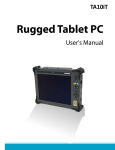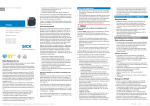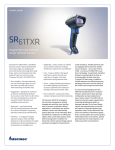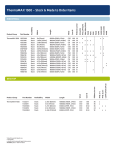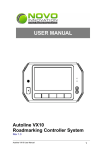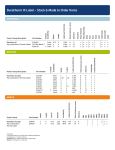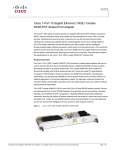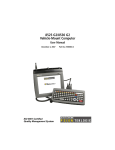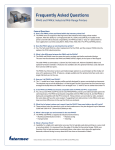Download Intermec EasyCoder® PF2i Label Printer
Transcript
• Manufacturing Operations • Warehouse Operations • Supply Chain Operations • In-Transit Visibility • Store Operations • Field Service Intermec RFID Readers Meeting the scalable RFID challenge. How To Determine Which Reader is Right For You Not all readers are created equal, and for good reason. The application, along with the information demands of your enterprise data systems, plays the biggest roles in determining the type of reader you need. Your application may dictate the use of a sophisticated RFID reader capable of controlling peripheral devices based on data read from the tag, or you may need to attach your RFID reader to a separate local server or a programmable logic controller for local decision making. The questions below have “either/or” options that can help you determine whether you need a simple reader or a smart reader. 1. Will filtering of redundant tag data need to be performed at the reader level (smart) or by a server or host (simple)? 2. Are Industrial PC’s or PLCs currently used (simple) or will local decision making need to be handled by the reader (smart)? 3. Do you need integration of business processes at the point of activity to minimize RFID integration without disruption to existing business process and backend systems (smart). Or, are you modifying your backend system to accommodate new RFID business processes (simple)? 4. Will manipulating the tag data format need to be performed at the reader level (smart) or by a server or host (simple)? Readers: Simple versus Smart With a primary function of collecting and passing on tag data, simple readers rely on a host system “up stream” for decision making. The host system functions can either be performed by a tethered handheld or vehicle-mounted computer, or via a WiFi® or cabled connection to a server or industrial PC. This is an adequate solution in environments where industrial PCs are already relied upon to drive application-based decisions. When the application requires real-time decision making based on the data collected from the tag, smart readers are the clear choice. Local intelligence within the smart reader allows it to not only evaluate the data on the tag, but also respond to it, such as triggering a red signal light to indicate that manual intervention is required. Because decisions are made by the reader, they occur without communications or server-induced delay. A simple reader, combined with a single antenna, will usually provide a cost effective solution when 1) there is already a local controller, 2) tags are consistently oriented the same way and always located in the same place, and 3) only a few tags travel through the RF field at a time, relatively slowly. Simple readers with multiple antennas can alleviate issues with tag orientation, quantity and speed by increasing the “read field”. Additionally, simple scanners offer a more economical option for enterprises that want to leverage their investment in existing handheld and vehicle-mounted computers to achieve RFID capability. Smart readers combined with multiple antennas are better equipped to cope with the unpredictable tag placement, tag volume and speed, while also providing local filtering. Smart readers with a single antenna are often mobile and therefore offer best solution for exception reading and subsequent tag re-writing because local decision making can be taken directly to the item to be read. The charts on the following page recommend readers for specific applications and offer a comparison of features. Simple readers are identified in gray. RFID Reader Options by Application Application IP4 IF30 IF4 IF5 IF61 • • • • • • • • Stretch Wrap Station Item and case-level, pallet association. • • • • Overhead Reading Bulky single items and pallets-level • • • Conveyor Item and case-level Dock Door or Portal Pallet-level • Handheld Reading Item, case and pallet-level IV7 PM4i PF2i • Forklift / Vehicle Mounted Case and pallet-level, location • RFID Label Printing Tag commissioning and verification • Airline Bag Tags Tag commissioning and verification • • • Simple readers are identified in gray. RFID Reader Feature Comparison Feature IP4 IF30 IF4 Internal support for Java and Java Script IF5 IF61 • • • Support for SAP-AII & IBM WRDI Additional Memory Option • • Ethernet • • • • • • • • • • • • • • • • • • • • • • • • • • • • • RS232 (API) • Internal power supply • • • Vehicle mount Simple readers are identified in gray. • • • RS232 (Configuration) Battery powered PF2i • Support for EPC ALE, ECP LLRP, EPC RM, EPC DCI USB PM4i • Internal support for C# .Net and VB.Net WiFi (802.11) IV7 • Intermec RFID Readers IF30 Fixed Reader The IF30 is a cost-effective, high performance fixed reader that reliably reads and writes UHF RFID tags in “RF noisy” environments. With best in class dense reader mode performance, the IF30 fixed reader allows users to grow their RFID operations to include multiple dock doors in close proximity, thus enabling accurate, automated receiving and shipment verification. Unlike all competitors, the IF30 has a built-in power supply and 4 mono-static RF ports which reduce the costs and complexity at installation with fewer component pieces to complete the overall solution. Typical Applications: Conveyor scanning, stretch wrap stations, work-inprocess monitoring in supply chain management for retail operations, indus trial manufacturing, and logistics. Specifications Dimensions: 12.75”L x 3.25”H x 8.9”W Operating Temperature: -20°C to 55°C (-13° F to 131° F) Frequency Ranges: 865, 869 and 915 MHz Tag Air Interfaces: Fairchild G1, ISO 180006b, ISO 18000-6c, Philips Version 1.19, EPCglobal UHF Gen 2 Connectivity: Ethernet IPv4 & IPv6, RS232 for configuration Certifications: FCC, ETSI Environmental Protection: IP53 IF4 Fixed Reader The IF4 is a simple reader or “peripheral device”, with best in class dense reader mode performance, specifically designed with a RS232 port for a cost effective solution for implementing RFID by attaching the reader to a programmable logic controller (PLC). When identifying relatively small numbers of items at a time, such as boxes traveling on multiple conveyor belts, cost savings can be achieved by deploying a single IF4 reader with four antennas instead of installing four separate readers with one antenna each. Typical Applications: Conveyor scanning, stretch wrap stations, work-inprocess monitoring in supply chain management for retail operations, indus trial manufacturing, and logistics. Specifications Dimensions: 7.5”L x 2.6”H x 5.3”W Operating Temperature: -20°C to 55°C (-4°F to 131°F) Frequency Ranges: 865, 869, 915 or 950 MHz Tag Air Interfaces: EPCglobal Gen 2, ISO 18000 6-b. Connectivity: RS232 Certifications: FCC, ETSI IF5 Fixed Reader The IF5 was rated the #1 reader for RF noisy environments by independent testing lab ODIN technologies. Considered a smart reader, custom applications running on the IF5 enable it to filter information from tags, as well as monitor external sensors and control audible and visual indicators, without the expense and potential additional failure point of a separate server “box” that is often required by other RFID scanning solutions. The IF5 filters, manages and acts upon the data read from tags according to application parameter. Typical Applications: Dock door scanning and overhead scanning in supply chain management for retail operations, consumer goods and industrial manufacturing, and logistics. Specifications Dimensions: 14.0”L x 3.75” H x 9.1”W Operating Temperature: -25°C to 55°C (-13° F to 131° F) Frequency Ranges: 865, 869, 915 or 950 MHz Connectivity: Ethernet, 802.3 wired, optional 802.11g Tag Air Interfaces: Fairchild G1, ISO 18000-6b, ISO 18000-6c, Philips Version 1.19, EPCglobal UHF Gen 2 Certifications: FCC, ETSI Environmental Protection: IP53 IF61 Fixed Reader The Intermec™ IF61 Enterprise Reader is the most powerful combination of reader and network appliance for running RFID applications, delivering faster processing at the edge of the network and faster decision making at the point of activity. Applications written in Java or C# .Net can run on the IF61 enabling it to filter, store and manipulate information from tags and send to a server in a required format. In addition, it can monitor external sensors and control audible and visual indicators without the expense, and potential additional point of failure, of a separate server “box”. Typical Applications: Dock door scanning and overhead scanning in supply chain management for retail operations, consumer goods and industrial manufacturing, and logistics. Specifications Dimensions: 12.74” L x 3.25” H x 8.9” W Operating Temperature: -25°C to 55°C (-13° F to 131° F) Frequency Ranges: 865, 869, 915 or 950 MHz Connectivity: Ethernet 10/100 BaseT, optional 802.11b/g Tag Air Interfaces: Fairchild G1, ISO 180006b, ISO 18000-6c, Philips Version 1.19, EPCglobal UHF Gen 2 Certifications: FCC, ETSI Environmental Protection: IP54 Shock and Vibration Protection: Meets or exceeds MIL-PRF-28800F, Class 2 IP4 Portable Reader The IP4 is snap-on accessory handle for the popular Intermec 700 Series Color mobile computers. The IP4 delivers first-of-its-kind capability by combining the power of a handheld mobile computing device equipped with Bluetooth™, WiFi® and WAN radios as well as a multi-protocol RFID radio that can be used worldwide. It allows the user to take the technology to the work—whether it’s on the shop floor, the store floor or the receiving dock, whenever it’s more practical to bring the read/write device to the tagged object rather than moving tagged objects passed a fixed reader. Typical Applications: Mobile RFID scanning outside of the enterprise, asset tracking, exception scanning and re-writing. Specifications Dimensions: 3.7”W x 7.0”H x 5.2”D Operating Temperature: -20°C to 55°C (-13° F to 131° F) Frequency Ranges: 865, 869 and 915 MHz Air Interface: ISO 18000-6b, ISO 18000-6c, EPCglobal UHF Gen 2 Connectivity: 802.11b to network via the 700 Series Mobile Computer Certifications: FCC, ETSI Polarity: available in linear and circularly polarized Environmental Protection: IP54 compliant IV7 Vehicle Mount Reader As the first RFID reader specifically created for mobile mount applications, the IV7 is designed for easy bolt in attachment to the Adaptable Load Backrest and serial attachment to the Intermec CV30 or CV60 vehiclemount computers. Both are built to withstand the rigors of harsh, industrial environments and are sealed to IP65 ratings. With best in class dense reader mode performance, the IV7C is the only forklift RFID reader on the market that is both EPCglobal certified compliant and interoperable. The IV7 not only delivers the flexibility of “read where you need,” but also a cost advantage over portal reader systems wherever the number of dock doors is significantly larger than the number of fork trucks. Typical Applications: Pick and put-away, cross-docking, shipping and receiving. Specifications Dimensions: 13.75”L x 3.75”H x 9.3”L Operating Temperature: -25°C to 55°C (-13°F to 131°F) Frequency Ranges: 865, 869 and 915 MHz Connectivity: 802.11b/g to network via the CV30 or CV60 Fixed Mount Computer, RS232 connection to computer Tag Air Interfaces: Fairchild G1, ISO 180006b, ISO 18000-6c, Philips Version 1.19, EPCglobal UHF Gen 2 Certifications: FCC, ETSI Environmental Protection: IP65 Shock and Vibration Protection: Meets or exceeds MIL STD 810F PM4i Printer The multi-function PM4i printer offers the reliability, ruggedness and performance expected from an Intermec bar code printer, along with the latest RFID technology. With the PM4i, companies can simultaneously encode and print RFID smart labels that can be used worldwide, thus enabling the tag to be read via multiple frequencies, dependant on regional standards. The PM4i printer can also act as a “smart client” executing user-defined programs for completely stand-alone printer applications. Typical Applications: Barcode and RFID label printing with tag verification. Specifications Dimensions: 21.38”L x 10.28”H x 11.73”L Operating Temperature: +5°- 40°C (+40°- 104°F) Frequency Ranges: 860-960 MHz Connectivity: RS-232, USB 1.1, Ethernet, optional 802.11 b/g Tag Air Interfaces: ISO 18000-6b, ISO 180006c, EPCglobal UHF Gen 2 Certifications: FCC, ETSI PF2i Printer The rugged, compact design of the Intermec EasyCoder PF2i RFID baggage tag printer make it ideal for meeting the demands of airline and transportation applications where space is limited and downtime is not an option. With few parts and a verified mean time between failure of 20,000 hours, the PF2i delivers exceptional reliability ensuring low cost of ownership. The RFID radio module within the PF2i encodes and verifies the RFID tags within the media ensuring a viable bag tag each and every time. The PF2i RFID bag tag printer can be complemented by the Intermec EasyCoder PF4i, a 4-inch print width version, ideal for printing full size boarding passes. Typical Applications: Baggage tag barcode and RFID label printing with tag verification. Specifications Dimensions: 15.6” L x 7” or 8.1”H x 7.6”W Operating Temperature: +5°- 40°C (+40°- 104°F) Frequency Ranges: 860-960 MHz Connectivity: RS-232, USB 1.1, optional Ethernet and 802.11 b/g Tag Air Interfaces: ISO 18000-6b, ISO 180006c, EPCglobal UHF Gen 2 Certifications: FCC, ETSI RFIDeploySM Services for Assured RFID Success • • • • Feasibility Analysis Process Analysis Site Analysis Site Installation Even with standards, RFID is nothing close to being a plug-and-play technology. Many enterprises lack the expertise on staff to handle system design and implementation or to anticipate the complexities and consequences of the decisions to be made. With years of experience installing complete RFID systems around the world, Intermec is committed to working with companies to make sure each implementation of RFID technology is successful, today and tomorrow. The long-term value, return on investment and total cost of ownership of an RFID system are all heavily dependent on the initial process design and implementation decisions. A solid business case, appropriate system architecture, and equipment that is optimized to satisfy both will provide the foundation of a successful project. Engaging Intermec RFIDeploy SM Services early in the process increases the chances for success. The use of professionals also helps avoid roadblocks that can prolong implementation and undermine ROI. North America Corporate Headquarters 6001 36th Avenue West Everett, Washington 98203 Phone: (425) 348-2600 Fax: (425) 355-9551 South America & Mexico Headquarters Office Newport Beach, California Phone: (949) 955-0785 Fax: (949) 756-8782 Intermec’s RFIDeploy Services help customers by evaluating RFID technology and integrating it seamlessly into their business processes. RFIDeploy is a suite of consultative and site engineering services that combine together to accomplish a fully integrated RFID system implementation by virtue of an inter-service feedback process. These services— Feasibility Analysis, Process Analysis, Site Analysis, and Site Installation— support the end user with a level of confidence in his RFID-related business decisions derived through proof of concept. The process is completed when the Site Installation tests out the performance level of the system against success criteria specified in the Process Analysis and confirmed during the Site Analysis. When RFIDeploy services are engaged, performance of the RFID system is guaranteed to meet the criteria for success established in the Process Analysis for 18 months after hand off to the end user. Europe/Middle East & Africa Headquarters Office Reading, United Kingdom Phone: +44 118 923 0800 Fax: +44 118 923 0801 Sales Toll Free NA: (800) 934-3163 Toll in NA : (425) 348-2726 Freephone ROW: 00 800 4488 8844 Toll ROW : +44 134 435 0296 Asia Pacific Headquarters Office Singapore Phone: +65 6303 2100 Fax: +65 6303 2199 OEM Sales Phone: (425) 348-2762 Internet www.intermec.com Worldwide Locations: www.intermec.com/locations Customer Service and Support Toll Free NA: (800) 755-5505 Toll in NA : (425) 356-1799 Media Sales Phone: (513) 874-5882 Copyright © 2007 Intermec Technologies Corporation. All rights reserved. Intermec is a registered trademark of Intermec Technologies Corporation. All other trademarks are the property of their respective owners. Printed in the U.S.A. 611571-01F 05/07 In a continuing effort to improve our products, Intermec Technologies Corporation reserves the right to change specifications and features without prior notice.






